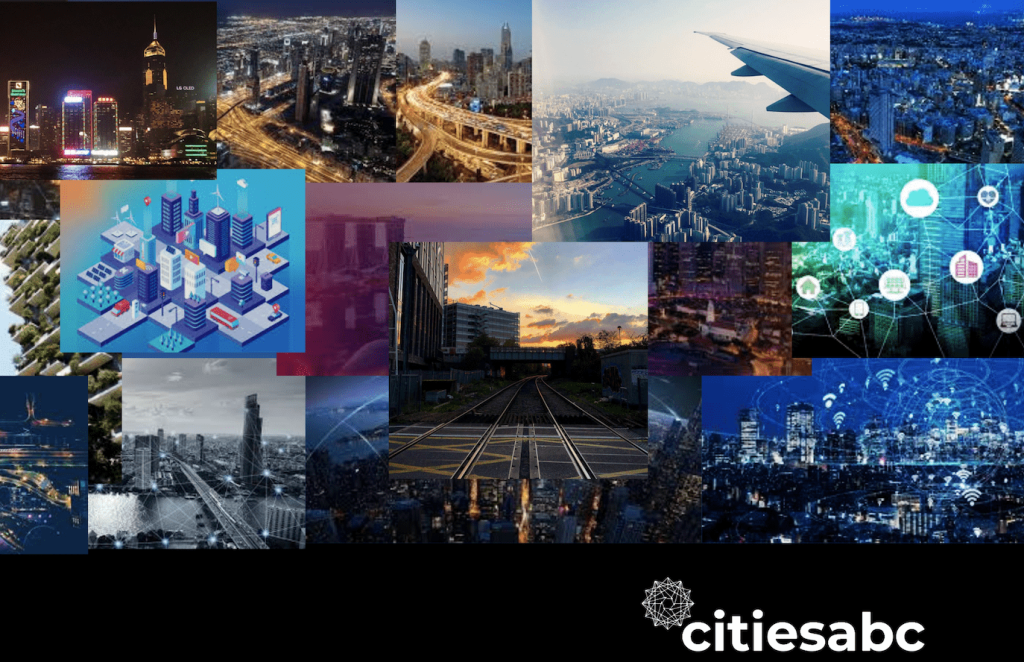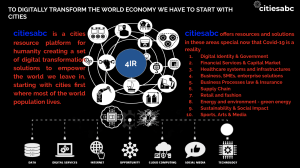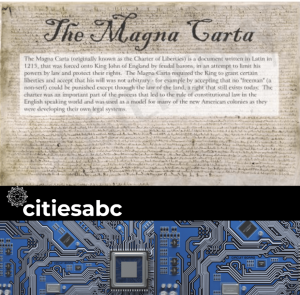
citiesabc a Magna Carta a decentralised digital transformation hub for Humanity
written by Dinis Guarda with Prof Yu Xiong
We created the new digital empowerment project www.citiesabc.com out of the need to unite and reinvent cities.
We would love for you to collaborate with us to create a better narrative for our cities and communities in this world of increasingly change and disruption.
The cities abc platform aims to unite and create resources for cities and citizens and works as a cities abc, a wiki cities platform (now in beta) that will become a decentralised movement and marketplace using the best of the Foruth Industrial Revolution 4IR and Blockchain, AI and fintech technologies!
We all live in cities today. Cities are the epicentre of our humanity social models. But cities need to become smart, need digital transformation. Need all of us aligned to create more sustainable models and better health and wellness. Special in a moment like we are there is more than ever a critical need to align efforts and find new ideas, projects and enable our digital tools to unite us and find better ways.
Now more than ever in a world global technology connected we as citizens and our cities are facing so much bigger challenges than our previous generations. We need a new humanity based in a betterment cities abc narrative.
We can make change. We can reinvent, unite, support, rank with new empowerment tools the m cities/nations with a 4IR Blockchain, AI, Fintech, IOT digital platform.
We need a tech blockchain, AI new 4IR Magna Carta for our cities – our communities and find how to use our digital tools and platforms to coordinate, support and unite cities and their struggling populations.

What has been will be again,
what has been done will be done again;
there is nothing new under the sun.
Ecclesiastes, 1:9
“Magna Carta still forms an important symbol of liberty today, often cited by politicians and campaigners, and is held in great respect by the British and American legal communities.
The original Magna Carta Libertatum (Medieval Latin for “Great Charter of Freedoms”), was done more than 800 years ago and the commonly called Magna Carta (also Magna Charta; “Great Charter”), was a major breakthrough in vision and creating a new narrative for social economic powers. This document of the Thirteen venture was an inception charter of rights that was initially agreed to by King John of England at Runnymede, near Windsor, on 15 June 1215.
The document was First drafted by the Archbishop of Canterbury to make peace between the unpopular King and a group of rebel barons, it promised the protection of church rights, protection for the barons from illegal imprisonment, access to swift justice, and limitations on feudal payments to the Crown, to be implemented through a council of 25 barons. At the time this was unique as a legal and government documentation but also as a solution for the social issues of the time.
4IR Blockchain: Magna Carta for Internet
There are strong synergies between the 4IR blockchain and Magna Carta. Magna Carta provided the framework for modern-day governance through the rule of law, the fourth Industrial revolution and special blockchain is able to provide a framework to govern the information and data, with code and programmes.
With 4IR and blockchain technology, Bitcoin, has proved this point for more than 10 years. Nowadays Blockchain technology has been used more widely in different sectors, it will construct a more defined and profound framework for this digital world.Another similarity between Magna Carta and blockchain comes from the decentralised nature of the both. Symbolically, the Magna Carta decentralized the political power, through law, Kings and Nobles not immune to rule of law, and ensured people’s. Similarly, highly decentralized networks generated by blockchain technology are providing an open foundation with strong assurances for objective property rights, impersonal rules and consistent enforcement. Blockchain can ensure people to have right on data with decentralized system, without the centralized control from government, and commercial giants, such as google, facebook etc.
Magna Carta marks the equal rights from elites to everyman politically, and blockchain will continue the spirit and realise the goal through technology.
Before blockchain was invented, people have little or no ownership over the digital information/fortune that they create or the value that derives from it. Now it gives the ownership of data/money back to users. Blockchain secures data to be replicated across several unrelated nodes. No single node can act as a gatekeeper and assume control of your data. Transactions in the ledger are stored in a permanent and verifiable way. Users who store information on the blockchain retain access to it through encryption keys, independent of the service or application that generated it. With the state of arts technology, people will enjoy the whole ownership of all things (data, information, fortune) that should belong to them. This is the spirit of Magna Carta as well — give the rights and choices back to people. This will make us live in a better world.
Businesses and customers all want to get better service with a cheaper price. Due to its decentralized nature, Blockchain removes the need for middlemen in many processes for fields such as payments and real estate. In comparison to traditional financial services, blockchain facilitates faster transactions by allowing P2P cross-border transfers with a digital currency. Property management processes are made more efficient with a unified system of ownership records, and smart contracts that would automate tenant-landlord agreements.
Blockchain also provides the opportunity of a far more secure method than other record keeping systems, because each new transaction is encrypted and linked to the previous transaction. Blockchain, as the name suggests, is formed by a network of computers coming together to confirm a ‘block’, this block is then added to a ledger, which forms a ‘chain’. Blockchain is formed by a complicated string of mathematical numbers and is impossible to be altered once formed. This immutable and incorruptible nature of blockchain makes it safe from falsified information and hacks. It’s decentralized nature also gives it a unique quality of being ‘trustless’ – meaning that parties do not need trust to transact safely.
With the blockchain ledger, each time an exchange of goods is recorded on a Blockchain, an audit trail is present to trace where the goods came from. This can not only help improve security and prevent fraud in exchange-related data, supply chain, identity sources for cities, citizens, its organisations and businesses, but it can also help verify the authenticity of the property, forms of communication, traded assets. In wellness and helathcare medicine, as we are now facing the biggest pandemic could be used to monitor clinic trials, track the supply chain from manufacturer to distributor, or in the food, provenance industry to provide an irrefutable proof of source and ownership.
Beyond numerous new services and products that blockchain could bring to us, it also has a meaning for data decentralisation and freedom. The British Library recently conducted a survey with about 3,000 participants with the purpose of creating a digital “Magna Carta” for the Internet age, resulting in a top ten list of declarations for the World Wide Web. Roughly 500 stipulations were conceived by the surveyed group, ages 10-18[1].
The biggest ultimatum given was for the Internet to be free from control of governments or corporate entities. The number 1 clause for the Digital Magna Carta reads:
“The Web we want will not let companies pay to control it, and not let governments restrict our right to information.”
Align with the 800th anniversary of the Magna Carta (June 15, 1215) and the 25th birthday of the World Wide Web, British Library launched a project called “Magna Carta: My Digital Rights”. Young people should think about issues of privacy, access and freedom in the digital age, originally raised by Magna Carta. And Blockchain is one of the tools to achieve this goal[2].
With the fast development of blockchain, and the synergies between Magna Carta and 4IR and technologies such as BlockChain, AI Magna Carta should be granted a new meaning: a symbol of liberty, empowerment in the technology and innovation, special for our organisations and cities.
[1] https://cointelegraph.com/news/millennials-demand-web-freedoms-in-digital-magna-carta
[2] https://www.bbc.co.uk/news/technology-33132662
Utopia – dystopia it is build with our perception!
It depend on the narrative we build with our actions, especially around our core values in our interactions with each other & our communities.

a tree of hope
there is a mysterious tree of hope inside all of us…
but very few nurture behind the greediness of the corrosive iron poison of fear…the linguistic insolence of proud… when sprinkled in significant quantities…we were all babies once but few of us kept the kindness soul that is part of the DNA of our humanity…we are all beacons of eternity in our fragile quantum physics of mortality…love is a complex metaphysic of what we want to be and what we cannot stop being… even… when love is sometimes transfigured in a hedonistic nature of hate…but what makes humanity special is the capacity to evolve in its nature and mind and create beautiful poetry dreams out of the chaos and nature…
to unite minds and build new stories, narratives and intelligence in ways to open new doors in whatever perceptions we have around us!
If you are interested to join please join us on:
